Systemic vertigoes: reflections on the family clinic of Ménière’s disease
Abstract
Meniere's disease, a disabling disease of uncertain origin with a wide range of symptoms including dizziness, nausea, tinnitus, progressive hearing loss and fullness, causes significant traumatic outcomes for both patients and their family. Caught by the emotional shockwave, they will be forced to take supportive measures to replace the patient's functions.
This chronic disease causes both the unveiling of a complex clinical picture, which is characterized by the invisibility of personal suffering, and the progressive worsening of a further disabling and extensive psychological distress.
The articulation of a multidisciplinary intervention protocol, to which various clinical orientations contribute, activates a complex process that responds to the patient's needs. This approach translates the symptomatic expression of Meniere's disease into a specific family lexicon and stimulates a joint family rewriting of the history of the disease as an opportunity to renew relationships as well as a personal and collective transformation of life trajectories.
Therefore, the family clinical process restores subjective dignity to the patient and alternates, in a game of figure-background, the patient's emotional distress with that of family members, weaving new meanings that legitimize the direction of treatment. It rewrites the patient-caregiver relationship with morphogenetic instances and resilient versions of emotional bonds.
Downloads
Downloads
Published
Conference Proceedings Volume
Section
License
Copyright (c) 2021 Donatella Bottiglieri

This work is licensed under a Creative Commons Attribution-NonCommercial-NoDerivatives 4.0 International License.
Authors who publish in this journal agree to the following:
- Authors retain the rights to their work and give to the journal right of first publication of the work simultaneously licensed under a Creative Commons License - Attribution that allows others to share the work indicating the authorship and the first publication of this journal.
- Authors can accept other non-exclusive licensing agreements for the distribution of the published version of the work (eg. Deposit it in an institutional repository or publish it in a monograph), provided to indicate that the document was first published in this journal.
- Authors can spread their work online (eg. In institutional repositories or on their website) before and during the submission process, because it can lead to productive exchanges and increase the work published citations (See The Effect of Open Access) .





